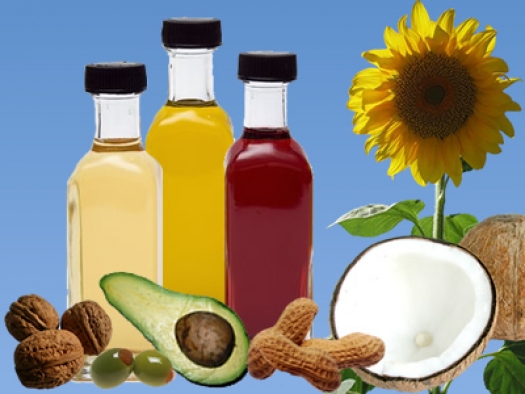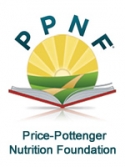Fats that are good for you
healthyoils.jpg

Collage by FAIM
Healthly oils include walnut, olive, avocado, peanut, coconut, sunflower, sesame, macadamia nut, and palm kernel oil.
After reading Dispelling the Big Fat Myths: Part 1, you now have an excellent idea of what fats are bad for you – trans fats, cottonseed and canola oils – but what fats are actually good for you?
Sesame, peanut, sunflower, macadamia nut and walnut oils are all good for you, so long as these oils are truly cold-pressed and are not overheated when used in cooking. Organic, cold-pressed is ideal. Any of the nut oils are healthy if they are pressed properly. Two of the healthiest nut oils are coconut oil and palm kernel oil. Coconut oil in particular is an ideal choice because as a stable oil, it can be heated to very high temperatures when used for cooking. Heating coconut oil does not cause lipid peroxides, and coconut oil has been shown to be beneficial in alleviating symptoms of many diseases, such as Candida, thyroid disorders and Alzheimer’s.
What makes an oil cold-pressed? In the United States the designation cold-pressed requires that no heating device be used during, or after, the pressing of the oil. However, keep in mind that an oil can become heated during processing because of how fast the seeds and nuts are pressed and because during pressing, thousands of pounds of pressure are applied to the food. Therefore, the practice of processing an oil may allow that oil to be overheated to the extent of damaging the oil, which in turn, makes it detrimental to your good health. Therefore one must do research when shopping for cold-pressed oils. Luckily, David Getoff, CCN, CTN, FAAIM, your Attaining Optimal Health in the 21st Century instructor has done some of this homework for you.
Omega Nutrition, Flora Health and Rapunzel all produce high quality nut, seed and fruit oils. These companies do not expose the oils they produce to temperatures hotter than 120°F. If the press grows too warm during oil production, it is shut off until it cools down before pressing resumes. Rapunzel oils are available through Whole Foods. Omega Nutrition oils can be purchased directly through the Omega Nutrition website. Flora Health oils can be purchased directly through the Flora Health website or in various health food stores. The safflower oil from any of these three companies is also acceptable. However, David recommends that safflower oil from any other company not be used, as it has most likely been overheated.
Oils are excellent for satiation, and can be used to make homemade salad dressings and mayonnaise. David prefers to make his mayonnaise with walnut oil.
David also recommends extra-virgin olive oil, although olive oil has a low smoking point and should not be used for cooking. Extra-virgin olive oil indicates that the olive oil is from the first pressing and is therefore 100% cold-pressed. This also means there is very little water in the oil, which makes it more nutrient-dense than other olive oils. David’s favorite brand of extra-virgin olive oil is Bariani olive oil. Bariani produces only olive oil. Spectrum also makes a healthy extra virgin olive oil. However, any other Spectrum oils have been over-processed and overheated, and are not suitable for consumption.
David also recommends avocado oil. Avocado oil is high in tocopherols, which are vitamin E molecules. Vitamin E is an important (fat-soluble) nutrient which protects fats. You’ve already learned that fats are sensitive, some more than others and some fats and oils can be harmful to you if overheated and over-processed. Nature’s secret to protecting fats is vitamin E which prevents fat and oil oxidation. Vitamin E can even protect omega-3s (and other fats) in the body, and prevent them from oxidizing, until they enter the cell wall and nourish your cells. David’s favorite avocado oil is Bella Vado, which is available at some Whole Foods locations or at the Bella Vado website.
Raw, organic, butter from grass-fed cows is another healthy fat that David recommends. Butter is an excellent source of absorbable vitamin A and also contains vitamin E to protect the fats and other nutrients in butter, making them accessible to the body. During his travels in which he studied the nutrition habits of different cultures across the globe, Dr. Weston A. Price found many people considered butter a sacred food. Dr. Price realized butter is full of fat-soluble nutrients which allow the body to easily absorb minerals. On many occasions Dr. Price used high quality butter from pastured, grass-fed cows to bring people back to health. Butter is a stable cooking oil at low temperatures, and contains medium chain fatty acids (MCFAs), as does coconut oil. The body can use MCFAs for fuel and generally does not store MCFAs as excess body fat.
Another butter product that is nutrient-dense is ghee. Ghee is easily made at home by heating butter and skimming the resulting foam from the top. Ghee is easily digested by those who cannot tolerate lactose and casein because both of these offenders are removed. Use ghee for high-temperature cooking, as it contains less water than butter and is more heat stable.
Lastly, don’t forget the fats from healthy, properly-raised animals. If the chicken you are eating was allowed to roam a yard and eat worms, weeds and grasses that it found itself, rather than the typical corn-and-grain diet in a confined-animal-feeding-operation (CAFO), it is a healthy chicken. This type of chicken is excellent for consumption because it is nutrient dense. Not only is the meat nutrient-dense, the skin from the chicken is nutrient dense and the fat from this skin allows the body to absorb the vitamins, minerals and other nutrients from the meat. David advises you answer the following questions when determining animal fat consumption: What did the animal eat? How was it raised? And are you overcooking the meat?
For more information contact Lindsay Wikholm, Administrative Assistant at the Price-Pottenger Nutrition Foundation®.
Join PPNF and be a part of an international network of people dedicated to achieving optimal health. Please visit the PPNF Blog to read more articles from the Price-Pottenger Nutrition Foundation®.
See also Dispelling the Big Fat Myths: Part 1 – The importance of fats and which ones to avoid on the FAIM website.


